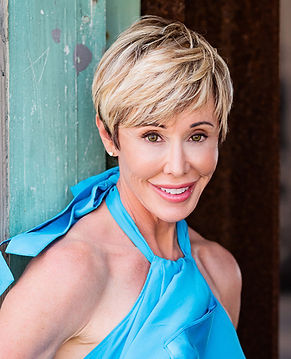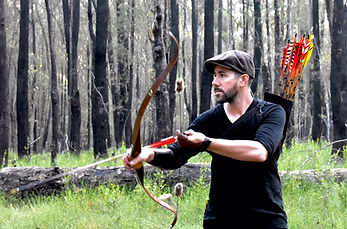Inspiring, Supporting and Advocating for the VI community.
Guest Blogs
Stephanae McCoy - Because We Are Captivating
Interview On The Reid My Mind Podcast
Email: smccoy@boldblindbeauty.com
Website: www.boldblindbeauty.com
Facebook: @BoldBlindBeauty
Instagram: @BoldBlindBeauty
Twitter: @BoldBlindBeauty
To find out more about the Reid My Mind Podcast visit here:
Humbled by Tragedy and Strengthened by Resolve
By Catherine Harrison
@catherineharrison_model on Instagram
"Take a good look at the faces of your three sons because you will not be able to see them as grown men". This was the cruelest way I can think of to tell someone they are going blind...yet that is exactly what happened to me.

I was diagnosed with Retinitis Pigmentosa (RP), a blinding, genetic retinal disease in 1995 and told to prepare for a life of darkness. In a short amount of time, I lost my career as an Operating Room Nurse, my driver’s license, my ability to read, my independence and for the most part my self-worth.
I struggled for several years to adjust to the progressive vision loss because this was not supposed to happen to ME. I had been a professional ballerina, was the wife of a plastic surgeon, mother of three darling boys, and a former model turned nurse. I had served as a missionary in Africa, lived a magical life and blindness was not part of my future plan. Like so
many others with vision loss, I began to fall down frequently, tripped on toys, hated going out to dark social events, almost got run over by cars, used the wrong spices in cooking and had days I wallowed in self-pity.
About sixteen years ago, with the support of my faith and family, as my sight grew smaller I not only accepted my fate but I had a change of heart. I realized my sons were watching me and learning how to handle the curve balls of life, and I wanted to be a good example.
It occurred to me one day that just because I couldn’t see it didn’t mean I had to give up my goals and dreams or stop being me. I decided that if I was going to go blind I might as well do it dressed to kill, with a cute hairdo, in high heels and being good at it. I will give people a reason to stare other than my cane.
I learned to be very independent with my white cane, became a Braille reader, used adaptive technology and even attended a school for vision impaired adults to fully adapt to my blindness. I quickly learned the power of the white cane…if you swing it wide enough, people will get out of your way!
Since then I have been a national public speaker, started my own non-profit ministry, am an active community volunteer, managed my husband’s medical practice, serve on numerous non-profit boards and have now gone back to work as a commercial print model.
I work out six days a week, love to rock climb, travel the world, still take ballet class and I am really good at shuffleboard!
I have learned what it is to be humbled by tragedy and strengthened by resolve. I found my strength from pushing myself up off the floor then learning to rise with grace and a smile after falling.
I will admit it has taken a lot of hard work to put my white cane out in front, step into my strength, being confident in who I am, knowing my limits and still be a tender-hearted woman.
For me, it is not about fighting against the darkness blindness brings; those are facts I can’t change. But I can change how I approach the challenges and how I show up each day. I make a choice to show up strong, fearless - walking in the strength of my faith, dressed on point and modeling a life that does more than just survive.
I am still in the driver’s seat of my own life, even though I don’t have a license!
I use my modeling career as a way to empower others to choose strength and to not let circumstances decide who they become.
Don't be fooled by stereotypes: The unintended compliment
By Andrew Donald
Andrew Donald is a traditional archer, martial artist, musician, teacher and photographer, with rod-monochromatism, currently living in Melbourne, Australia. He is interested in disrupting stereotypes around what it means to have low vision. Find Andrew on Instagram.

Most of us have been guilty of imposing assumptions on others. These can be seemingly harmless comments like, “it sure is sunny inside”, a light hearted joke I’ve frequently heard when wearing sunglasses indoors or at night. Or more pointed comments and actions created through ignorance, a lack of empathy or understanding and often delivered from a place of personal insecurity. While these outwardly
imposed assumptions and interactions can have serious consequences and long lasting impact, they can also be directed inward towards ourselves. Overcoming our individual limitations is a challenge everyone faces when we attempt to express ourselves through art, work, relationships, and life in general.
I have always enjoyed pursuits that provide great personal challenges - the kind of self expressive arts that are impossible to master in a lifetime. These include music, martial arts, photography, and most recently archery. The process of learning these pursuits - several of which appear to rely heavily on vision - has presented diverse and unique personal challenges. While I am not the first vision impaired person to devote myself to these arts, just as vision loss is extremely varied and individual, the adaptive solutions that work best for me have been particular to my experiences.
The conditions of my vision has a diagnosed name - rod-monochromatism - but it is not, by any means, the only “peculiarity” that requires unique adaptations, and in many ways does not even pose the greatest challenge. There are more subtle aspects of our personalities that can impact our ability to honestly express ourselves: self-consciousness, confidence and the fear of failure are all linked to the desire to live up to certain expectations and conform to stereotypes. Acknowledging these preconceptions is sometimes, for me, very difficult and extremely confronting but I believe essential in freeing us to forge our own path and reach our full potential. After years of training martial arts I was able to find styles and unique approaches that meant I could not only engage on par with non-vision impaired martial artists - I would often have an advantage over my training partners.
While archery is still new to me - I have been practicing for almost five years - a lifetime of experience in adapting to my strengths has helped me rapidly find an approach to shooting a bow and arrow - giving me the ability to perform as well or in certain circumstances, better than my non-vision impaired archery friends. Sharing my archery journey through social media has also allowed me to connect with many like minded people, exchange experiences and establish some truly amazing friendships. But, as a public sharing platform, social media has also generated some doubt about the legitimacy of my low vision: “no way is this guy legally blind”. This scepticism is not limited to strangers online but surprisingly also encountered through people I know quite well, away from social media. I have come to believe, however, that if my ability to adapt and overcome my own limitations challenges the stereotypes of what it means to have low vision that it is in essence an unintended compliment; that I must be expressing myself honestly.
We all become experts in concealing what we perceive as weaknesses. I am quite skilled at hiding my vision impairment; it was, I thought, a helpful skill growing up to “fit in”, but has also led to unexpected downsides and dangerous situations. Lately, as a man in my mid 30s, I’ve been struggling with the balance to “fit in” and need to publicly display my low vision: in ways like using an ID cane after moving to a much larger and unfamiliar city, or using magnifiers at various new jobs. This resistance is my own way of attempting to conform to a stereotype - overcoming it is liberating. I also feel a great sense of satisfaction in disrupting the notion of a stereotype - so much so, that people find it difficult to understand how a legally blind person can so accurately shoot a target at distance.
There is still so much I have to learn - a lifelong quest to better understand myself and the complexities of how we individually and collectively experience the world around us. I also believe that in order to find our own path we need to break free: be fearless, open minded and companionate to others as well as ourselves. Forge your own path and you will better understand yourself as well as the people around you. It is only when we feel compelled to follow the crowd that we become “disabled” by our individual experiences.
I have often wondered if my interest in these pursuits is driven by a deeper desire - to overcome the stereotypes of what it means to be vision impaired. Would I have been as interested in them if I was born without Rod-Monochromatism? The answer I continually arrive at is yes. It is through these arts that I have learnt the most about myself and the world around me.